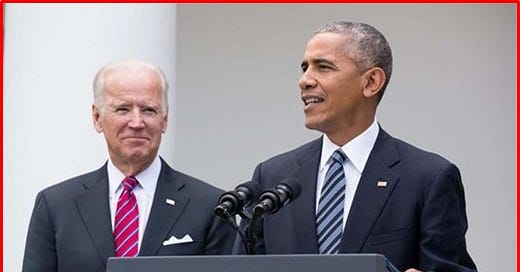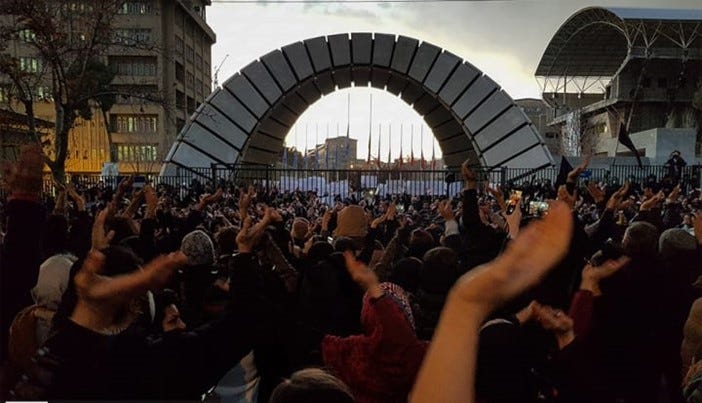Public Health Policy Reviews 18:
20 Years of US Military Domination in the Middle East – Part 5 – Gaza and Yemen.
President-elect Joe Biden and former President Barack Obama in December 2020. Image: Twitter.
NOTE: Nazia Saeed, a Human Resources professional living in Abu Dhabi, United Arab Emirates, contributed significant research and writing for parts of this article.
**********
Photo by Bruno Guerrero on Unsplash.
According to the Mayan calendar, the final human reckoning for our time on Earth was supposed to happen on December 21st, 2012.
Twenty-twelve came and went, but humans survived. The Mayans’ prophecy that the world would end in 2012 was wrong.
However, given US President Joe Biden’s lack of leadership and moral authority regarding the current conflicts in the Middle East, the Mayans might be correct that an “extinction-level” event will happen just fourteen years after 2012.
Until recently, President Biden has expressed dedicated support for Israel’s brutal response to the October 7th terrorist attack on Israel by the Palestinian terrorist organization operating from Gaza. Hamas militants killed 1,200 Israelis and foreign nationals on October 7th. The militia also committed mass rapes of Israeli women and girls – and kidnapped hundreds of international visitors to the region – including Americans.
Israel has responded to the October 7th Hamas attack by unleashing horrific violence upon the civilian population of Gaza over the last eight months.
**********
Israeli Defense Force (IDF) soldiers. Photo image by Timon Studler on Unsplash.
Retaliatory military violence by the Israeli Defense Force (IDF) has killed over 35,000 civilians and forced hundreds of thousands of Palestinians into refugee camps in Rafah.
The IDF has also decimated the civilian infrastructure of Gaza and created a massive public health and humanitarian emergency in the region. As the IDF prepares for an all-out military assault on Rafah against Mr. Biden’s wishes, the violence is threatening to engulf all the Middle East.
Israel has struck Lebanon and Iran with bombing raids as Houthi rebels from Yemen have attacked the merchant ships of Israel, the US, and their international allies in the Red Sea. The Houthis say they have been attacking the ships since November 2023 because of the Israeli bombing campaigns and military incursions into Gaza.
Houthi rebels have been fighting a civil war in Yemen against a governing coalition backed by Saudi Arabia, the United Arab Emirates (UAE), and the US since 2012.
**********
Yemen: Humanitarian Catastrophe and Health Crisis
Photo of a Socotra dragon tree, or “dragon blood tree, native to the Socotra archipelago in Yemen. Image by Andrew Svk on Unsplash.
Much like the conflicts in Iraq, Syria, and Iran – the civil war in Yemen was one of the world’s worst humanitarian crises until Israel invaded Gaza last October.
The ongoing violence has destroyed infrastructure, including hospitals and water treatment facilities, leaving millions of Yemenis without access to primary healthcare and clean water. The blockade imposed on the country has exacerbated food insecurity and malnutrition, contributing to the spread of infectious diseases such as cholera.
After Joe Biden defeated Donald Trump to win the 2020 Presidential election, Mark Lowcock, the United Nations (UN) Under-Secretary-General for Humanitarian Affairs and Emergency Relief – urged the UN Security Council to act in Yemen.
Secretary Lowcock and World Food Program Executive Director David Beasley testified on the effects of the Yemeni civil war and five years of blockade by Saudi Arabia and the UAE.
“…9 million Yemenis could lose access to basic health services, and treatment of more than half a million malnourished children could stop,” said Lowcock.
**********
A Photo of a Yemeni girl by Andrew Svk on Unsplash.
What Secretary Lowcock and Mr. Beasley forgot about the Yemeni civil war: Joe Biden was serving in the Obama administration as Vice President when the US was backing the Saudi and UAE governments against the Yemeni rebels in 2012.
Protecting national sovereignty and democracy are among the reasons President Biden intervened in Ukraine after the Russian invasion in 2022. However, Mr. Biden’s “see-no-evil” response to Israel’s brutal military attacks on Gaza (snipers shooting women and children, forced migration of hundreds of thousands of Palestinians, forced starvation, energy deprivation, etc.) reveal the hollowness of humanitarian rhetoric from Biden and other Democrats.
Zealous pro-Saudi and pro-Israel support from the Biden administration is perpetuating the decades-long cycles of hate and violence that form the basis of the enmity between Jews in Israel and Palestinians in Gaza.
**********
Gaza: Blockade and Health System Strain
Photo by Mohammed Ibrahim on Unsplash.
Just as the US is currently supporting the blockade in Yemen, Israel has subjected the Gaza Strip to a crippling blockade since 2007.
With tacit support from the United States, the blockade in Gaza has severely restricted the flow of goods, including essential medical supplies and equipment, into the territory. As a result, the healthcare system in Gaza has been chronically underfunded and overwhelmed.
Public health authorities in Gaza have struggled for decades to help Palestinian civilians cope with high rates of poverty, unemployment, and psychological trauma due to years of conflict and siege.
Regrettably, it only takes a brief review of American international policy in the 20th century to remember that both Republican and Democratic Party politicians in the US have never let concerns for national sovereignty, democracy, or civilian lives prevent American interventions into leftist-leaning countries around the globe.
President Biden abandoned Afghanistan, clearly favors Israel over the Palestinians, and is now bombing Iranian-backed Houthi rebels in Yemen.
**********
The Illusion of “America First”
Photo by Samuel Branch on Unsplash.
Let us compare Donald Trump’s policy record in the Middle East with that of Biden.
A significant setback for diplomatic efforts in the Middle East happened in December 2017. President-elect Trump recognized Jerusalem as Israel’s capital and moved the US embassy from Tel Aviv to Jerusalem.
On January 20th, 2017, Supreme Court Chief Justice John Roberts swore in Donald Trump as the 45th Commander-in-Chief of the US Armed Forces. Mr. Trump immediately moved to show his support for Israel on a global scale.
Two days after Mr. Trump’s inauguration, Israeli Prime Minister Benjamin Netanyahu announced his plans to remove limits on Jewish settlements and allow for the expansion of settlement construction in the West Bank. Trump officially backed Mr. Netanyahu’s initiatives.
President Donald Trump tied American hegemony, US national security, and border security directly to the continuing threat that Western societies face from international jihadists. During his four-year term (2017 – 2021), Mr. Trump took aggressive rhetorical and policy positions against the Islamic faith, Middle Eastern countries, and people of Arabian descent.
**********
A 2020 public protest at Amir Kabir University in Tehran, Iran. Image courtesy of Wikipedia Commons.
President Trump’s first official policy regarding the Middle East was a travel ban.
The Trump administration implemented the original iteration of the travel ban in 2017. The ban placed strict restrictions on travel to the US for citizens of Iran, Iraq, Libya, Somalia, Sudan, Syria, and Yemen. Mr. Trump withdrew from the Iran Nuclear Deal in 2018.
On March 21st, 2019, Trump recognized Israeli sovereignty over the Golan Heights, Tweeting: “After 52 years, it is time for the United States to fully recognize Israel’s Sovereignty over the Golan Heights, which is of critical strategic and security importance to the State of Israel and Regional Stability!” -Donald J. Trump (@realDonaldTrump).
President Trump promised to destroy ISIS — overwhelming the caliphate and killing its leader, Abu Bakr al-Baghdadi, in October 2019. In January 2020, Trump ordered the assassination of Iranian General Qasem Soleimani.
General Soleimani was the commander of Iran’s notorious Quds Force and architect of Iran’s proxy wars in Lebanon and Yemen.











